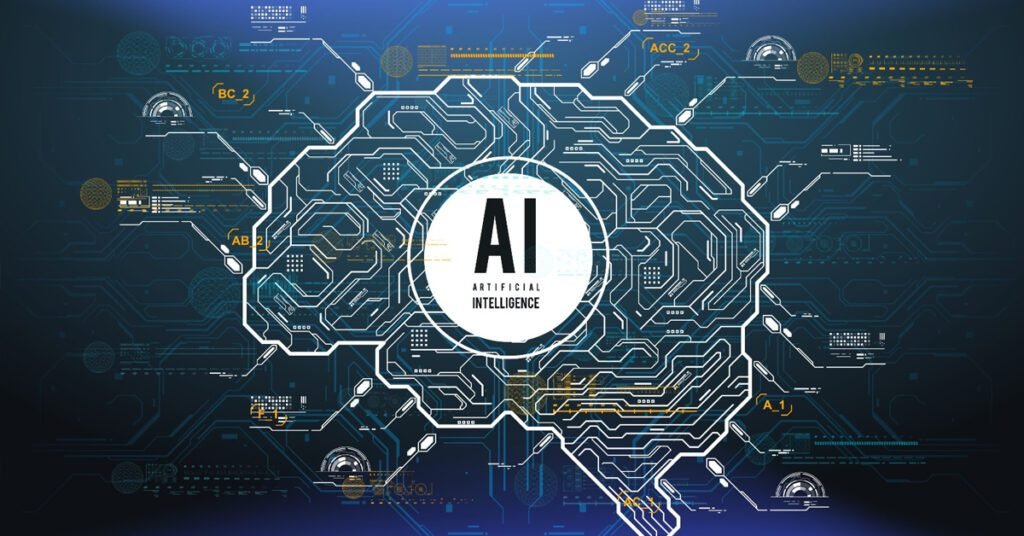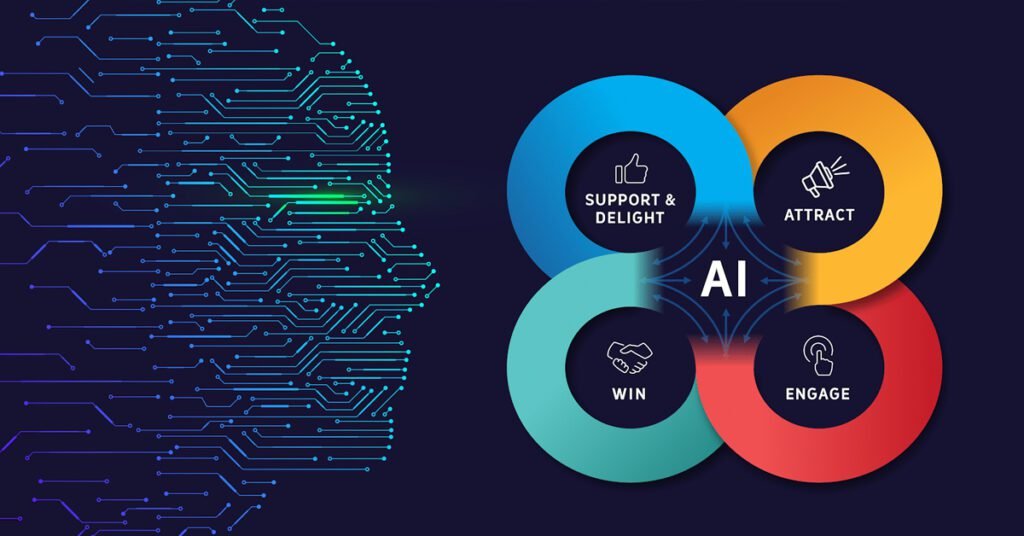Artificial intelligence (AI) is revolutionizing business operations with its ability to improve productivity through machine-human interactions. Today’s competitive landscape requires strategic AI implementation that is focused on real business needs in order to stay ahead of competitors.
What is AI?
Significance of AI

1. Automation
One of the most often mentioned advantages of AI technology is automation, which has had a big influence on the consumer products, transportation, communications, and service sectors. In such businesses, automation not only boosts output and productivity but also makes better use of raw materials, develops products with higher quality, cuts lead times, and improves safety. Additionally, automation can aid in resource freeing for use in other important business activities.
For instance, AI automation can increase the convenience of customer service. During an eight-hour workday, customer support representatives typically receive thousands of emails, which is too many for them to handle and reply to in a timely manner. On the other hand, AI chatbots respond to consumer inquiries instantaneously, reducing wait times for customers perpetually.
2. Smart Decision Making
Artificial intelligence has long been utilized to help businesses make more smart decisions. In order to make the best decisions for the business, artificial intelligence (AI) technology can plan data supply, assess trends, create data consistency, offer forecasts, and quantify uncertainties. AI will remain impartial on the subject at hand and assist in making the best choice to enhance business efficiency, provided that it is not designed to mimic human emotions.
AI is capable of making decisions faster and more precisely than humans. Airlines, for instance, can employ AI to continuously optimize ticket rates by evaluating competitive and demand-related real-time data, resulting in more effective pricing decisions.
3. Improved Customer Relationships
AI-powered solutions can assist businesses in promptly and effectively handling customer queries and grievances. Customers can receive highly tailored messages from chatbots that combine conversational AI and natural language processing technologies, helping them find the right solution for their needs.
Because AI is so efficient, there is a great deal of opportunity to improve the consumer relationship. Enhanced operational efficiency is the result of automating repetitive processes. It provides customized product recommendations and creates a more engaging customer journey by studying data about customers.
4. Advances in Medicine
These days, the healthcare industry is using artificial intelligence solutions far more frequently. For example, remote patient monitoring technology enables medical professionals to promptly make clinical diagnoses and provide treatments without needing the patient to physically attend the hospital. AI can be useful in tracking the development of infectious diseases and even forecasting their results and repercussions in the future.
For instance, Bot assistant can automatically organize files and images, transcribe case notes that are dictated, and respond to clinical queries. It reduces the time and expense involved in finding new drugs for patients by combining computational genomics with powerful machine learning.
5. Data Analysis and Research
Data analysis may be done far more effectively with the assistance of AI and machine learning technologies. To process business data and understand the possible results of various trends and events, it can be helpful to create predictive models and algorithms. Furthermore, AI’s advanced computing capabilities can expedite data processing and analysis for research and development projects that would have taken too long for humans to analyze and understand.
Businesses may optimize production schedules, save costs, and boost overall efficiency by leveraging data to facilitate better decision-making. Walmart, for example, optimizes their supply chain by leveraging the insights provided by AI.
6. Solving Complex Issues
AI is now able to address complex business problems because of advancements in technology, which range from simple machine learning to sophisticated deep learning models. Artificial intelligence (AI) is assisting businesses in a variety of industries in identifying the best ways to solve their problems more effectively, from fraud detection and customized consumer interactions to weather forecasting and medical diagnostics. Higher productivity and lower costs are the results of more effective problem-solving in complex business situations.
Real-world example: To identify and stop fraudulent activity, a financial institution can deploy an AI-driven fraud detection system. Through the analysis of transactional data, this machine-learning program is able to identify suspicious patterns and anomalies in a range of financial interactions.
7. Business Continuity
AI-powered business forecasting helps businesses in making important decisions but also helps them prepare for any emergency and maintain business continuity. Today’s risk management significantly depends on data management and analysis; hence, AI-powered solutions can assist businesses in taking a proactive approach to managing crisis. Businesses can also use AI and machine learning to generate scenarios that will aid in the development of a prompt disaster recovery plan.
For instance, in any business, forecasting and risk assessment are two vital elements. Algorithms driven by AI are able to examine past historical information, identify trends, and forecast future threats or vulnerabilities. Businesses can proactively plan for a range of events thanks to this predictive capability.
8. Managing Repeated Activities
Completing routine business activities takes a lot of time and can become monotonous, which eventually lowers employee productivity. Robotic Process Automation (RPA) solutions with AI capabilities can automate interactions across various business systems, saving the business time and effort. Within digital systems in the HR, IT, marketing, or sales divisions, it can mimic human behavior to swiftly complete any business task without requiring manual labor.
The place of work is not immune. By automating time-consuming and tedious repetitive jobs, artificial intelligence (AI) is transforming the workplace. AI-powered business solutions can complete complex tasks with unmatched accuracy and efficiency, which helps businesses save a lot of money.
9. Reducing Errors
Reducing the possibility of human error is another great advantage of adopting AI solutions to automate routine business processes. Robotic Process Automation (RPA) solutions can increase the efficacy of digital systems and reduce the probability of errors in data processing as they manage the data entering and processing tasks. For businesses who can’t afford to make even the smallest mistakes, this can be pretty helpful.
For instance, AI is vital for streamlining traffic in the transport sector. Artificial intelligence (AI) helps to improve traffic management by forecasting traffic patterns and analyzing real-time data. This lowers the possibility of human errors, which could cause accidents and congestion.
10. Enhanced Productivity in the Business
Artificial intelligence will provide the same level of performance and consistency throughout the day, contributing to the provision of services that are available around the clock. Artificial intelligence technologies won’t grow weary or bored when handling repetitive jobs. Employee stress can be decreased and business efficiency can be increased by reassigning employees to more difficult activities that need human intervention.
When considering the internal affairs of a business, AI software can greatly improve workflow and its results. AI lowers costs and facilitates more efficient inventory management. Artificial intelligence replaces human guesswork by enabling accurate, real-time monitoring of the return on investment in marketing efforts. For instance, AI Fleet management systems help simplify logistics, reducing the cost of receiving and shipping goods.

How to Overcome the Challenges in The Way of Adopting AI?
Here are a few tips for businesses on how to overcome the challenges of AI adoption:
Explore the topic: Speak with people who have used AI in business and who understand it, and explain your business’s goals. Seek models that tackle practical business problems rather than AI only for AI’s sake.
Begin modestly: Avoid attempting to quickly integrate AI throughout your whole business. To begin, list a few specific domains in which AI can be useful.
Collaborate with AI and business specialists: Working together with a company that understands both aspects of the situation will enable you to get your business going swiftly and effectively.
The Final Word
The benefits of AI are readily available for those who begin to understand and use AI earlier than their competitors, as with any innovative technology. The path to AI mastery is not easy, but with expert guidance, challenges can be overcome and your business can acquire a significant competitive edge that will benefit both employees and customers.








